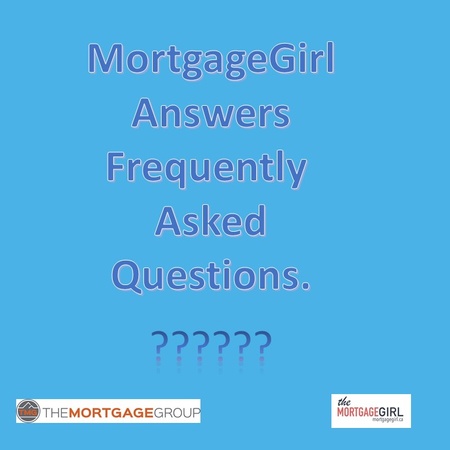MortgageGirl Answers Frequently Asked Questions (Summer 2018)

Do you have mortgage questions? The MortgageGirl can answer today’s most commonly asked questions
How much house can I afford to buy?
I constantly get asked this question and due to recent mortgage rule changes, the answer is now quite different than it was last year at this time. Basically, the new house debts such as mortgage payments, property taxes and condo fees if applicable along with your other current debts relative to your “qualifying” income is what is used by lenders to evaluate how much you can afford.
Using an online calculator most often does not simply give the answer as the answer isn’t really that simple anymore as all lenders do not calculate what income can be used to qualify in the same way. I have one lender who will only recognize 25% of average overtime income earned over the past 2 years. Another lender I work with will include the child tax credit though many won’t. Another lender I went to just recently would only include 4 income sources even though I had 3 applicants on the mortgage who, between them, each had employment income, while another was paid the child tax benefit and child support while another was paid pension income, rental income and investment income. They did qualify for the mortgage with all of the different income sources, but they didn’t with this lender!!!
If I don’t qualify with my bank, how can a Mortgage Broker help?
Your bank has one set of rules and guidelines and if you can’t meet them, they will decline you. Further to that, if you are buying a home with less than 20% down payment and the insurance company declines you after your bank recommends approval, if your bank doesn’t have access to all 3 insurance companies currently available in Canada, you are declined.
On many occasions, I have found that after one insurance company declines an application, another one will approve. And some lenders won’t even send the file to another insurer after it has been declined by one, because that’s their policy. As mortgages are the main and only focus of Mortgage Brokers, the experienced ones have done a large number of mortgages over their career and tend to have solutions to some problems that someone with less experience may not have.
An example would be an application I worked on where the borrower’s consumer debt minimum payments were too high. She had $10,000 owing in credit card debt and an unsecured line of credit with a $40,000 limit which was maxed out. Under the new qualifying guidelines, even though the required minimum payments were interest only, 3% of the balances owing must be used in meeting the debt servicing requirements which was $1500 per month for the $50,000.
I had her go to the bank who had the line of credit and have them increase the limit to $50,000. This way she could pay off her credit card debts with the increased line of credit proceeds. She still owed the same $50,000 though one of my lenders will calculate the minimum payment for an unsecured line of credit limit of $50,000 differently so the minimum payment included for that same $50,000 was reduced to only $301 per month.
Why can’t I qualify for the “best” rates I see advertised?
Before all of the mortgage rule changes, you could simply phone any lender and ask them their best mortgage rate. The answer was the same for just about everyone who asked. Now, before quoting a rate, the lenders need to know whether the home will be owner occupied or a rental, how much the purchase price is and your down payment amount, what your credit score is and are you buying, renewing or refinancing? The rates are the lowest for buyers putting down less than 20% and the mortgage has to be insured. The next best rate is for buyers putting down 20% or more who can qualify over 25 years and at today’s benchmark rate of 5.34% (government set qualifying rate at July 29, 2018) The rates can be quite a bit higher for those with 20% or more down payment who are refinancing, buying rental properties or amortizing over 30 years.
If you have mortgage questions, why not contact the MortgageGirl.ca and ask her. She is a former banker turned Mortgage Broker with over 36 years of experience. Contact her via phone 780-433-8412 or email info@mortgagegirl.ca. Follow her on Facebook (MortgageGirl.ca), Twitter (MortgageGirl.ca) or on Instagram (MortgageGirl.ca)